Hands On: The Witcher 2: Assassins of Kings
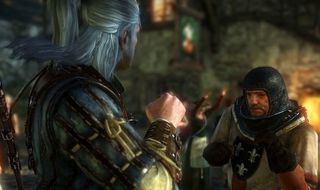
Love or hate The Witcher, not many who played it could have expected its sequel to become one of the most anticipated games of 2011. A little known world, based on books that hadn't even been translated into English. A script so hacked up, it needed a complete do-over to be comprehensible. Opening chapters that should have been burned out of the game with an arc welder . A game that went out of its way to offer interesting moral choices, complex storytelling, a wonderfully dark new fantasy flavour, and one of the best RPG experiences around... only to have it all completely overshadowed by silly collectable playing cards of assorted peasant girl boobies. Sigh. Great game. Not always easy to like.
The Witcher II: Assassins of Kings is more than just a sequel. It's CD Projekt's chance to turn a cult RPG success into a huge mainstream hit, with all that hard-won experience joining forces with a brand new engine, and riding a wave of warm sentiment via the Enhanced Edition of the first game, and Good Old Games. I just finished playing through the Prologue and the whole first Act - ten glorious Witchering hours, give or take - but is it really the epic RPG we've all been hoping for? Hint: Yes.

What stands out most about The Witcher 2 is - and believe me, it's a rare big budget game that gives off this vibe - is that it feels like the game CD Projekt wanted to make, with neither apology nor compromise getting in the way of its vision. The engine targets high-end systems because that's the only way to make it look this good. Characters happily drop words like 'fuck' and 'cunt' because it wouldn't be The Witcher's cynical world if they didn't. Playing as Geralt doesn't give you the same freedom of build and character as most other RPGs, because you're not here to be a Paladin or a Mage, but a Witcher - a very specific mix of fighter, sorcerer and alchemist, with a steel sword for slaying humans, and a silver sword for monsters. Through the levelling system, you can tip the balance towards any of those disciplines, but you still need them all, because that's how a Witcher rolls. Or makes heads roll, anyway.
Unlike the first game, which used the tiresome old amnesia gimmick to explain why Geralt couldn't witch his way out of a paper bag without much levelling, you start this one as a capable badass. You have access to all of the standard magical signs right from the beginning, and are immediately thrust into action alongside one King Foltest, as seen at the end of the last game. If you didn't play that, don't worry. Witcher 2 doesn't do a great job of establishing the story so far, but it doesn't take long for things to be explained. If you did, you can import your savegame and a few of the decisions will carry over. Unfortunately, I didn't have one to hand, so any plot bits here are based on the default settings.
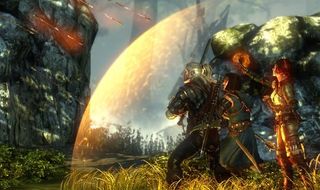
So much has changed since the original Witcher. Instead of using Bioware's Aurora engine, Witcher 2 has its own custom-made slab of beauty. Combined with a behind-the-character view, it makes for incredible vistas, terrific scale, and the kind of graphical fidelity that makes a PC cry and Dragon Age 2 look like a school play. There's a price though. The build I was playing still had some optimisation ahead of it, but the best I could get out of my machine was its self-titled Medium level graphics. The game still looked incredible, but I know it could have been better, if the build had offered some tweaking potential, like switching off the motion-blur and toning down the shadows or something at High, instead of being restricted to just Low, High, Medium and Ultra in the launcher. It still looked incredible, and was very playable, but definitely consider The Witcher 2 a Game To Upgrade For, if you've been holding out.
Whichever setting you pick though, the game looks terrific. It's not simply technologically advanced, though pick a swanky graphical technology and it's probably in here somewhere, but used with amazing skill. The opening prologue for instance takes you through castle siege, complete with rubble tumbling from buildings, armies massing, massive melees with enemy soldiers and even a dragon showing up to say hello and set fire to everything. It's stunning stuff, and while the price for that is that the prologue is ultra linear, it doesn't take long to get to the first town, where things are dirtier, but almost as pretty, and every other person has an optional task for the white-haired monster hunter wandering past.
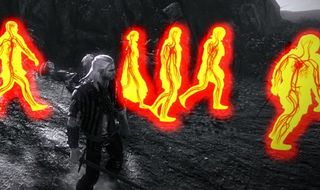
For all this visual improvement, it's the writing that most impresses. As with the first game, The Witcher was written by Polish writers, which immediately gives it a slightly different feel to most American made RPGs. This time though, the translation is excellent, and the character work is miles ahead. King Foltest for instance, who you start the game protecting, actually feels like a guy an army would follow. He takes time to acknowledge individual soldiers. He's savvy about the weapons being used against him (not least because they used to be his own), and has a compassionate side to go along with his hot-headedness. He immediately snaps at anyone who calls his illegitimate children 'bastards', and when the tide of battle turns, his orders are "Fall back, gods dammit! I forbid you to die like imbeciles!"
The biggest gaming news, reviews and hardware deals
Keep up to date with the most important stories and the best deals, as picked by the PC Gamer team.
(Admittedly, he also says 'They've taken a good position, the bastards! They'll pick us off like ducks, and I'm no duck!'. Not everything that falls out of his mouth is a nugget of word-gold...)
Is he a good king though? That's the kind of question The Witcher loves to play with. It's a very political game, one that still has little time for simple good or bad. Whether the bandit leader living in the woods is an honourable freedom fighter or a psychotic terrorist for instance depends entirely on your point of view. Is the town's leader a hyper-strict fascist just looking to line his pockets at the expense of elves and dwarves, or is he genuine when he explains that he's aware he has prejudices against non-humans, but tries to be impartial? More than any other major RPG, you don't choose between good and evil so much as aim for the lesser of two evils, or - if you prefer - the most convenient.
Some of the best touches are on a smaller scale though, like the moments where Geralt gets together with his friends to just talk politics, his deadpan responses, or cute details like the way the kids in town start following him around asking "White Wolf, are you the one who ate Red Riding Hood?" or asking if he carries two swords because he keeps losing one. Market traders shout things out, characters note your approach (although always with the same line, unfortunately) and there are more than enough people to fill out the scene. There's no great technical feat to this, unlike some of Bethesda's Skyrim plans, but that doesn't matter. After the ghost-town of Kirkwall, The Witcher 2 feels positively bustling.
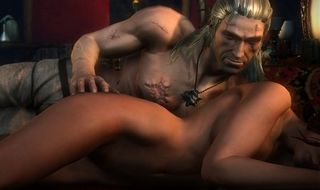
Onto the more 'mature' mature content. The Witcher's handling of sex was one of its more divisive design decisions, and that's likely to be the case here too. The main difference is that this time, the sexist elements feel more like the background of the world itself than the game being childish, from the notable way one female spy is introduced in her biography as one of the toughest under the local spymaster's command, yet still spends the entire prologue doing nothing but fetching drinks, to the nature of the more misogynistic characters. The first big example for instance involves a group of soldiers who apparently captured Geralt at some point during his missing memories, now greeting him like an old friend. "We'd have set you free, the sorceress too," says one. "Boholt was just fooling about the raping and all."
"Don't remind him!" hisses another. "We're old mates!" he adds, unconvincingly.
"You'd have raped an old mate?" asks Geralt.
"Just the sorceress!" the soldier protests.
Yep. Welcome to The Witcher 2. Remember that 'good' king from earlier? Even he doesn't bat an eyelid at mention of his soldiers raping and pillaging. Insults like 'cunt' and 'whoreson' are thrown around like confetti. Even a sympathetic troll who's sunk into alcoholism after the death of his 'woman' mostly bemoans the fact that nobody's cooking meat for him at home any more.
However, despite this - and based purely on the bits I've seen - while there's no arguing that The Witcher 2 is set in a frequently misogynistic fantasy universe, the game itself doesn't seem particularly objectionable. It doesn't make you play along with that line of thought, Geralt isn't up to his old Gotta Catch 'Em All tricks, and it tends to be the nastier people who start hollering that kind of thing. As an RPG, well, a lot of the female characters wear very revealing clothes, one sorceress actually does seem to be selling advertising space on her cleavage, and so on, but there's little particularly noticeable by the admittedly low, incredibly silly standards of RPG design to point out as offensive in Act 1. Hopefully later on the game there are more strong female characters of note to fill out the cast, and no major face-palm moments where the blame lies with the game, not its hard-edged setting and cast.
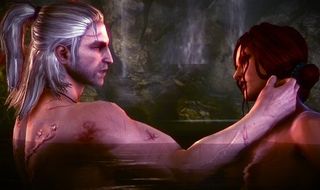
One big change from original Witcher is that while the silly collectible sex cards from the first game are out, fully animated sex scenes are now in, with no shame or censor bars. At the very start of the game for instance, Geralt's sorceress friend/lover Triss is lying stark naked in his bed, and barely upgrades to a towel for a chat. If you hire a prostitute at the inn (for research purposes, of course...), this isn't a game that just gives you a fade to black for the coin you're about to get a Quickload Refund on.
What makes this work better is that the one love scene in the preview code is more than just one of the Witcher's random shags. It's Geralt with Triss, two characters who (at least in my playthrough) were already in love. While searching for a magical rose, they fall into a beautiful elven shrine, and both play an active part in the scene that unfolds. Triss strips herself naked using sparkly magic and dives into the water, before finally tiring of Geralt taking forever to get undressed and playfully pulling him in with her. Over a very long scene, which will be on YouTube roughly 0.2 picoseconds after the game is released, they make out and do the deed, intercut with footage of elves outside discussing the meaning of the place. Yes, it's a hell of a lot of fan-service, mostly provided by loving, lingering close-ups of Triss' breasts and ass, but it's also a reasonably romantic scene that fits both characters' personalities.
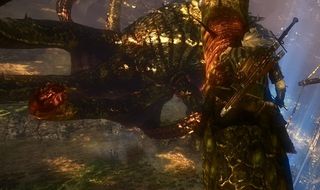
For most of the game though, you're using one of Geralt's other two swords. Combat is... it's an action game. Left-click does a light attack, right-click does a heavy one. It's not even worth discussing how different it is to the original game's style, because the two have basically nothing in common. Styles? Gone. Click-to-fight? Completely replaced by active combat. Top-down view? Behind Geralt's back.
There are some interesting twists. Pressing a button to bring up your list of Signs for instance doesn't pause the game, just slows it down by a factor of 'loads'. stopping the battles feeling stop-start. The finishing moves you can deploy against a stunned enemy are great, and just as cinematic as the standard cut-scenes. Most notably though, there are no health potions, and no in-fight top-ups. Any potions you make have to be drunk before the fight begins, while Meditating (which no longer requires a fire), and last for just under ten minutes. When battle rages, there's no stopping to break out a medical kit or cast a healing spell. You win by being better and/or tougher than your enemies, or they crush you.
And that's great, fighting against one or two enemies. It's satisfying, attacks feel good, and Geralt seems a badass just for having the balls to take the monsters and armies of bandits on in the first place. Switching swords for different types of enemies is a great mechanic. The spells at your disposal are - at least in the opening chapter - there to swing a battle in your favour rather than win it outright. With Yrden, you place traps and build barriers. Igni is a simple fireball. Aard is a force-bolt. Quen is a personal shield that can be upgraded to deflect damage instead of soaking it. Axii tries to force an enemy to fight his friends. Several also serve roles outside of combat, for things like Force Persuading people to do your bidding, or knocking down walls hiding treasure. Your ability to use them is tied to your stamina, which also determines how much you can parry blows, but quickly regenerates during combat, depending on which potions you've drunk and which skills you've pumped talent points into.

The problem - and this could well be one of those 'Richard Sucks At The Game' type issues - is that while this is great against one or two enemies, The Witcher 2 often unleashes swarms of the buggers. When this happens, the hurting starts. Once you've pressed an attack button, you can't interrupt it for, say, a block. A sword-swing may only take two seconds, but that's a long time when four enemies are hitting you, and especially when they can interrupt the crap out of you . They can easily knock you back instead of just doing damage, and until a particular talent unlocks around Level 10, you take 200% damage from any attacks behind you. Quite often they get to hit you with bleeding or poison effects too.
Your main defenses are Parry (which doesn't become omnidirectional before a particular talent), which you quickly run out of stamina to use, a shield that soaks up damage but doesn't last long, and a Roll, which is great when you've actually got somewhere to roll to , but otherwise just buys a scrap of time before you get surrounded again. Yes, you can mix up potions to help you, but the problematic fights don't tend to be the big boss ones where you have a reason to sit back and meditate before leaping into danger, so much as several mobs just showing up to eat my health bar as an afternoon snack.
Losing to these encounters was always frustrating because it felt like the combat mechanics themselves were fighting for the enemy team. Scanning through the talent tree, especially on the swordmaster side, several of the talents on offer seem to be based on the 'this irritated the living shit out of you so now it'll feel extra-good not to have to care any more' school of design, like being able to dial-down backstab damage to 100% (two talent points) or actually counter blows instead of just blocking them.
Grrrrrr.
On the plus side, the regular fights, rather than the ones thrown in as psychopathic roughage, were always entertaining, and felt well balanced. One-on-one, or against a couple of guys, you get to feel why people are so nervous about going toe-to-toe with a Witcher. Geralt is a great character for playing a little metagame I like to refer to as The Teacher. How do you play it? Like this. Find an NPC who acts like a dick. Introduce him to many fireballs. Addressing his corpse, ask: "Now what did we learn?"
Feel free to substitute fireballs with a sword to the face if you prefer.
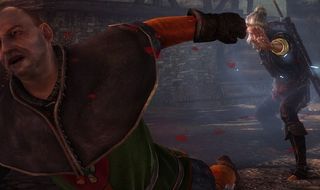
The best compliment I can give The Witcher 2 is to tell you how I played it. I started playing it in the morning. I played it right through in one sitting, and emerged, bleary eyed, around midnight, stopping only for a sandwich around lunch, and an unwanted phonecall about double glazing. By the end, I was regretting every new click of the mouse and completed subquest, not because of any disappointment with what was happening, but because I knew it wouldn't be long before my Witcher supply got cut-off.
Will it be RPG of the year? Skyrim may have words to say about that, but it's definitely a contender. Assuming the storytelling remains at the level of this early slice, and a final optimisation pass makes it a bit lighter on systems or at least gives us more control over the graphics, only a few minor quibbles should stand in its way - and we're talking small stuff, like a bit too much backtracking, the mass combat problems, and a stealth mode that only gets away with being cack due to also being completely optional. Even with these things though, I had more fun playing this single chapter than the overwhelming bulk of Dragon Age II, or any other recent RPG. The Witcher 2 is simply more ambitious. It's braver. Above all else, it's hungrier, giving it that little extra edge from the first scene onwards.
I can't wait to sink my teeth back in, find out what the drug I agreed to take for some dodgy market traders actually does, see what's going on with the SPOILER after they SPOILER ed the SPOILER , and finally hook back up with SPOILER to grace his arse with my boot. (He knows what he did.) I almost regret having played the preview code at all, because as much as I was itching to get started on a new Witcher game, I'm even itchier to finish what I started. Possibly after a quick PC upgrade.
As Netflix's The Witcher Season 4 loses another star, once again I feel compelled to tap the 'this no-budget YouTube fan film does the Witcher better' sign

I can only assume this upcoming Witcher children's book takes it easy on the folk horror, fantasy racism, and brutal violence I associate with the series
Most Popular

